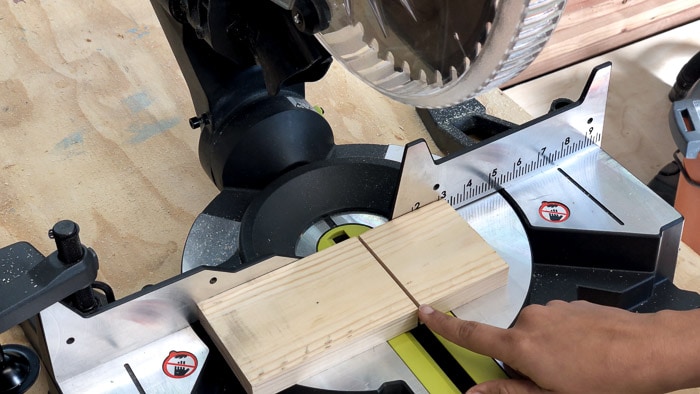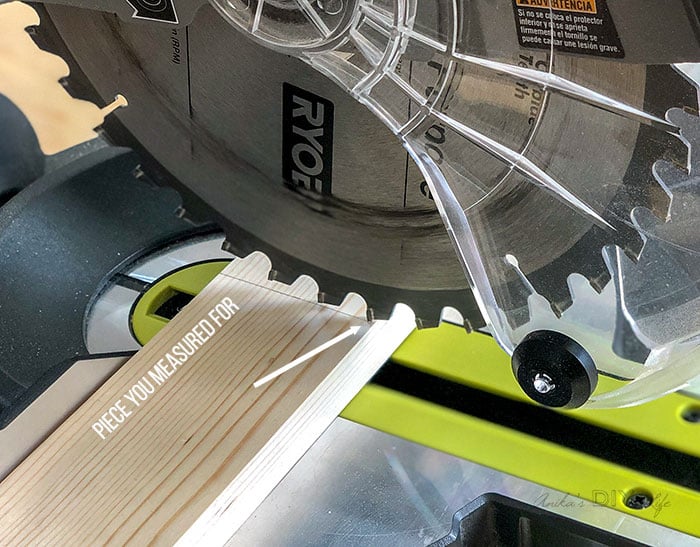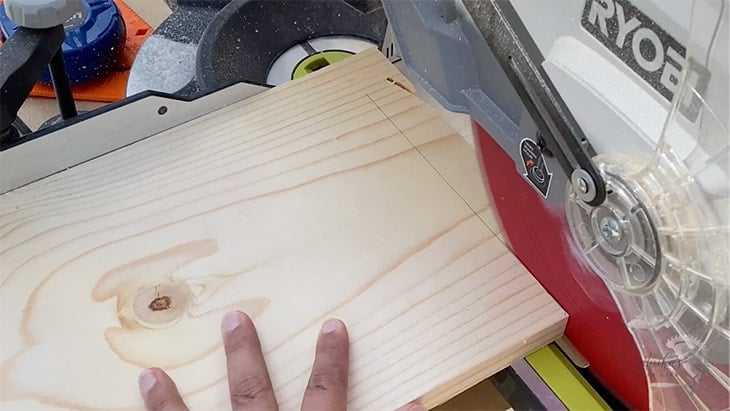5 Miter Saw Tips to Make Accurate Cuts
These 5 simple miter saw tips will help you make accurate cuts with your saw no matter your experience level. Don’t use your miter saw without reading these!

The miter saw is one of the first power tools I bought. It is still one of the most used tools in my workshop.
It took me a long time to figure out exactly how to use it so I could get the perfect accurate cut every single time.
It isn’t complicated – just a few simple things to check and keep in mind – a few before starting to use the saw and a few every time you cut.
Table of Contents
***This post contains referral or affiliate links. It is a way for this site to earn advertising fees by advertising or linking to certain products and/or services. Please read my full disclosure here ***
What you need to use a miter saw accurately
- A speed square
- A combination square
- A sharp pencil. I like using mechanical pencils
- A miter saw stand – I use this one. It is easy to roll away. You can also use a homemade stand.
- A good tape measure. This one is my favorite because of the quick-read markings.
My miter saw – This 10″ sliding compound miter saw
RELATED: See all the tools I use in my workshop
PPE while using the miter saw
Before you use the miter saw, it is important to follow all the safety guidelines. Be sure to read the manual and always keep your hand away from the blade!
Specifically, be sure to use –
- Eye Protection
- Hearing protection. This one is my favorite. Get $10 off with code ANIKA10
- Dust protection (currently unavailable).
How to make accurate cuts using the miter saw
If you are trying to understand how to use the miter saw, all its parts, and the types of cuts it can make, be sure to read “How to use a miter saw for beginners.”
There are 5 important things to follow in order to get the most precise cuts from the miter saw. They can be grouped into 2 major parts –
The alignment –
Even though the saw is set up at the factory, it can come out of square during shipping and movement. Therefore, it is important to do this as soon as you take it out of the box.
Also, kickback during use can result in the blade going out of square.
The operation –
These are steps you need to follow while you are making the cut every single time!
1. Align the table
This is to make sure that the blade is exactly perpendicular to the table. It helps to get straight cleans across the thickness of the board with no bevels.
To do this –
- Make sure the power cord is unplugged.
- Ensure the bevel gauge is set to 0 degrees.
- Slowly move the blade guard out of the way.
- Use a combination square to check if the blade and table are perpendicular to each other.

Important – be sure to avoid the blade teeth. Dinging them will cause them to dull.
No space visible between the table or saw blade and combination square – you are good to go!
If there is space, you need to adjust the blade until there are no gaps.
Consult your miter saw manual to check how to adjust for it. Usually, it is done by adjusting a nut or screw behind the bevel screw.
2. Align the Fence
This makes sure that the fence is perpendicular to the saw blade.
This helps make straight cuts across the boards.
To do this –
- Make sure the power cord is unplugged.
- Ensure the miter gauge is set at 0-degrees.
- Lower the blade down completely.
- Move the blade guard out of the way.
- Use a combination square to check if the blade and fence are perpendicular to each other.

Again, if you do not see any space between the blade or fence and the combination square, you are good to go.
If you do see a space, you will have to adjust for it.
Please consult your miter saw manual to see how this is done. There are typically bolts behind the saw to help with this.
3. Cut off factory ends
If you use a speed square and check the ends, you will almost always see
Factory ends on the boards are always off square.

If you use that end to cut lumber for your projects, you will end up with boards that are not straight and will lead to a lot of frustration.
Just cutting off 1/2″ to 1″ from each of the ends helps solve this problem.
4. Use a speed square for the cut line
Once you have measured and marked the board, use a speed square to draw a line across the board using a sharp pencil.

This will help in two ways –
- It will help guide your blade (as we will discuss next)
- It will tell you if your board edges are off square.
5. Account for the Kerf
Kerf is one of the most important concepts to understand when cutting material with any saw.
Once you understand kerf, you will be able to make precise cuts with any saw.
What is Kerf?
The Kerf is the width of the blade.
It is also the part of the board that turns into sawdust when you go through it with a blade.

See the part of the board that has disappeared above? That is kerf.
You have to account for it when you make make cuts.
Let’s take an example –
If you have a 10″ board and you want to cut it into two perfectly equal 5″ pieces – it is not possible. One of the pieces will be missing the kerf width.
My saw blade has a kerf of 1/8″ so to get those exact 5″ pieces, I will have to start with a board of 10 1/8″.
So how do you account for Kerf without ALL the math?
Its actually really easy! Here is the trick –
- Before you start off the cut, with the saw off, rest the blade on the piece.
- Align it so the edge of the blade is touching the line you want to cut.
- The teeth should fall just NEXT to the line so that the kerf is removed from the piece of wood you are not keeping.
- Once aligned, lift up the blade, start the saw and make the cut!

BONUS – Change the blade
While all miter saws come with a blade, they are often have a low teeth count and aren’t great quality.
The lower the number of teeth, the rougher the cut.

I recommend upgrading the miter saw with a new high-teeth count blade. I use at least a 60-teeth blade (this one has a thin kerf too!).
It makes every cut smooth clean, and as accurate as possible!
Of course, every time you change the blade, be sure to align the table and fence to make sure you keep getting awesome clean cuts!
RELATED – 5 SIMPLE BEGINNER WOODWORKING TIPS NO ONE TELLS YOU!
What about laser guides on a miter saw?
Yes, laser guides are supposed to make it easy and quick to cut your boards accurately.
To get that working perfectly, you need to first calibrate how your laser line falls on the line drawn on the board, so you can adjust for the placement when cutting.
I don’t even have a laser guide in my current saw.
My old saw had one, and I rarely used it because, with these simple steps, you can make highly accurate cuts!

So, there you have it – everything you need to know to make accurate cuts on a miter saw!
I hope this helps you make beautiful furniture and projects because the most important starting point is getting accurate, reproducible cuts.
Let me know if you have any questions!
You might also find these helpful –
- How to Align a Miter Saw : A Complete Guide
- Basic power tools beginners need
- How to use a Kreg Jig
- How to build drawers for beginners
- How to paint unfinished pine furniture
Plus, check out these 30 easy beginner woodworking projects!
Anika's goal is to inspire and empower beginners with woodworking, DIY, home improvement, and home decor ideas.
She wants everyone to unlock their creative potential and experience the feeling that comes with making something. Nothing feels better better than seeing something and saying "I can make that!"






